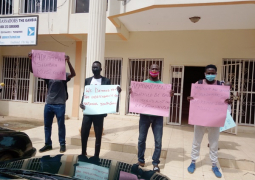Kumba is charged with murder. She was accused of the murder of Lamarana Jallow at Friendship Hostel in Bakau in 2022.
During Tueday’s session before Justice Ebrima Jaiteh at the Banjul High Court, Counsel Twum presented a compelling argument regarding the Motion on Notice. She contended that the previous detention of the accused in the convicted section of the Female Wing at Mile Two Prison is ‘unconstitutional’.
In support of the Motion on Notice, Counsel Twum stated that on the day of the transfer, prison and riot squad officers who were in complete riot gear removed the applicant from her cell in the remand section and without any notice of explanation, placed her in the convict section under compulsion and very intimidating circumstances.
Meanwhile, State Counsel M. Sanyang firmly dismissed the applicant's claim that Kumba Sinyan had been moved from the remand wing to the convicted wing of the prison. Instead, she clarified that Sinyan had only been transferred from one section of the remand area to another. This adjustment, she noted, was implemented to reduce overcrowding in the remand wing.
Counsel Twum further added: “On the 2nd day of September 2024, the applicant was transferred from the remand section of the prison to the convict section after a purported altercation with another female inmate of the said prison which occurred on the 29th day of August 2024.
“Our records indicate that the accused is a remand prisoner facing charges of murder, a crime that is non-bailable under the laws of our country. Furthermore, during the arraignment at the magistrate court before Magistrate O. Jabang, the accused was remanded in accordance with Section 208 A of the Criminal Procedure Code, which addresses the remand of individuals pending trial at the High Court,” she said, citing Section 208 A to bolster her assertions.
She noted that records showed the accused was subsequently presented before Justice Jobarteh at the High Court, where the Judge remanded her in accordance with Section 226 of the Criminal Procedure Code.
Furthermore, she stated that it is based on this warrant that they asserted that the accused was remanded by the High Court when she was later brought to trial.
“My Lord, it is evident from the wording of Section 226 that only the High Court has the competent jurisdiction to sign a remand warrant in cases such as this one, which involves murder.”
"In accordance with that remand warrant, the accused was held at the Mile Two Central Prison in the remand section of the female facility, as stipulated by Section 36 of the Prison Act Cap 20.1 Vol 4 of the country's laws, which addresses the separation of remand and convicted prisoners."
Counsel Twum directed the court's attention to Section 63 of the Prison Act, which addresses prison offences. This section, he continued, outlines the various punishments that are available under the act.
“In cases where someone is charged as alleged by the respondent, there are structured procedures akin to those in court, including a hearing where the accused is asked to plead guilty or not. However, such protocols were not followed at Mile Two in this instance, and the sole evidence we have is exhibit R 1."
State Counsel M. Sanyang insisted that relocating the accused from the remand wing to a designated area within the female remand wing is neither unlawful nor unconstitutional.
“In fact, the area to which the accused person was relocated is not the convicted section of the prison.”
The applicant is fully aware of the circumstances. "Initially, when she was remanded to the prison, she was placed in that location due to the overcrowding in the remand wing. Once the female remand wing was no longer congested and plans were made to transfer her to the main wing, she appealed to the prison officers, requesting permission to remain in her current location."
"I want to clarify that the location where the applicant is being held is not a correctional facility for convicted prisoners; it is part of the remand wing. Thus, transferring her to a more spacious area is not unconstitutional," she explained.
The case was adjourned until February 17 for a ruling on the application.




